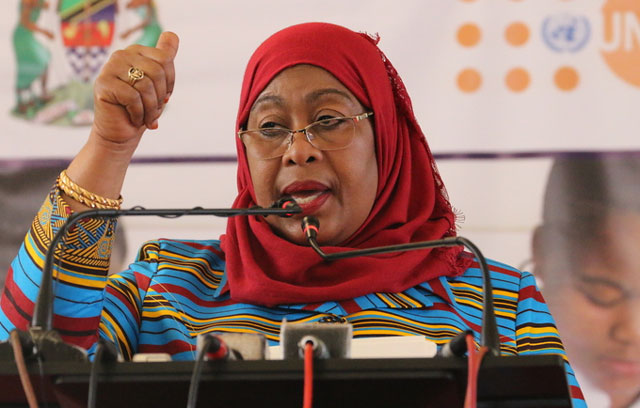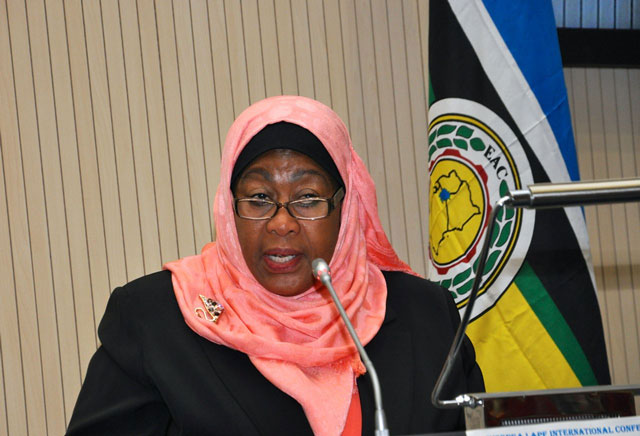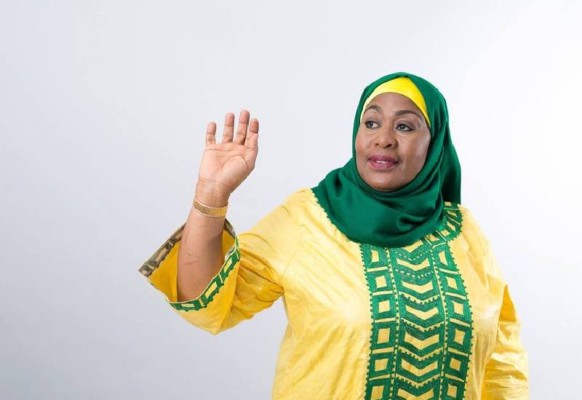Tanzania’s President John Pombe Magufuli was last night confirmed dead. This means, the Vice President Samia Suluhu Hassan who has been the most noticeable figure, representing Tanzania, at all international meetings in the past five years is set to be sworn in as the country’s next president.
Samia Hassan is set to become the first ever female president of the country and the first in the region of East Africa.
Who is Samia Suluhu Hassan?
According to the African community newspaper Mshale, “hers has been a slow and methodical rise to the top”. The result is that she is Tanzania’s first, and also the first female vice-president in the region since Uganda’s Specioza Naigaga Wandira Kazibwe 1994 to 2003.
Samia Suluhu Hassan, 61, is from Zanzibar is the 10th Vice President of the United Republic of Tanzania who first assumed Office on 5th November 2015, under President Dr. John Pombe Magufuli. Previously, she was a Minister of State, Vice Presidents Office in charge of Union Affairs.
In 2005-2010 she served as a Minister for Tourism, trade and Investment in Zanzibar and in 2000-2005 a Minister of Youth Employment, Women and Children Development in Zanzibar.

Education
Samia Suluhu Hassan received Primary Education in different schools including Chwaka Primary School in Unguja in 1966 to 1968, Ziwani Primary school in Pemba from 1970 to 1971 and Mahonda Primary School in Unguja in 1972, according to details on her biography on the Vice President’s website.
In 1973 to 1975 Samia joined Ngambo and Lumumba Secondary School in Unguja. After secondary education in 1977 she joined The Zanzibar Institute of Financial Administration (ZIFA) for Statistics studies.
After studies she was employed by the Ministry of Planning and Development. In 1986 she joined the Institute of Development Management- IDM (present Mzumbe University) in Morogoro for advanced studies in Public Administration.
After various studies in Tanzania Samia joined the National Institute of Public Administration in Lahore, Pakistan. In 1991 she joined the Institute of Management for Leaders, Hyderabad in India for a Certificate Management Course.
After studies in 1992 she was employed in a Project funded by the World Food Programme (WFP) between. Samia attended the University of Manchester in London for graduate studies to persue Postgraduate Diploma in Economics. In 2004 -2005, she progressed to Masters Degree in Community Economic Development through a joint-programme between the Open University of Tanzania and the Southern New Hampshire University ,USA.
Her Political journey
In 2000 Samia was elected as a member of the Zanzibar House of Representative for special seat and appointed as Minister by President Amani Karume. She was the only high-ranking woman Minister in the Cabinet. In 2005 she was re-elected and appointed as a Minister in another portfolio.
In 2010, she sought election to the National Assembly, she won by more than 80% standing in the parliament representing Makunduchi constituency. In 2014 President of United Republic of Tanzania Dr. Jakaya Kikwete appointed her as a Minister of State for Union Matters. In the same year she was elected as the Vice Chairperson of the Constitutional Assembly tasked with drafting the country’s new constitution.
In 2014 Samia was elected the Vice Chairperson of the Constitutional Assembly tasked with drafting the country’s new constitution.
In July 2015, the Ruling Party (CCM) Presidential nomenee John Magufuli chose her as his running mate for the 2015 General election, making her the first female running mate in the party’s history.

Politically astute
According to the newspaper Mshale, “she has demonstrated a proclivity for continual learning. With all the political temperature building up as the election neared in 2015, she received an Masters in Science in Community Economic Development through a joint-program between the Open University of Tanzania and the Southern New Hampshire University.”
In her native Zanzibar, she was the only high ranking female in president Amani Abeid Karume’s cabinet.
Her entry into national electoral politics, explains Mshale, came relatively late by African standards.
“I have risen to this position as a result of my competence and not through favors,” she has repeatedly said.
She is married to Hafidh Ameir, tying the knot in 1978, a union that has been blessed by one daughter and three sons.Ameir is a retired agriculture officer and is currently a consultant. Their offspring are in careers ranging from business to information technology. The daughter is the only one to have followed in the mother’s footsteps. The daughter, Mwanu Hafidh Ameir, is a member of the Zanzibar House of Representatives.
“Will a woman rise to the presidency in any of the Eastern Africa countries? Only time will tell,” asks Mshale in their 2015 profile.
The constititution states that next in line, if anything happens to the President, is the Vice President.
The last time a woman ran a country in East Africa was in 1994, when Agathe Uwilingiyimanain served as Prime Minister of Rwanda (specifically from July 18 1993 until her death on April 7 1994).
Do you have a story or an opinion to share? Email us on: dailyexpressug@gmail.com Or follow the Daily Express on X Platform or WhatsApp for the latest updates.

